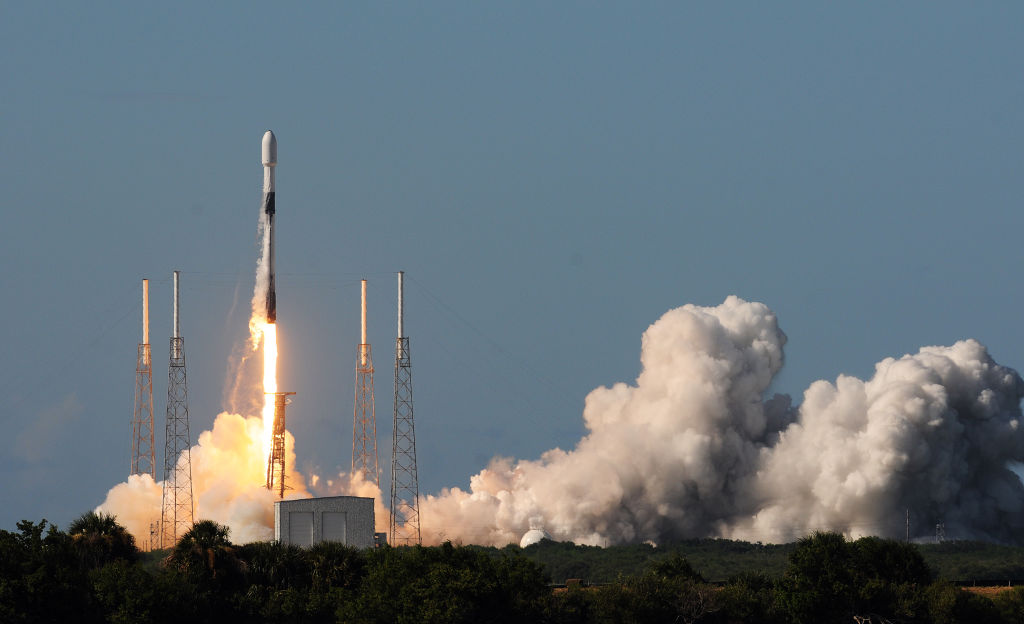
Both North and South Korea have had an action-packed year in space development, from unveiling new rocket designs to testing hypersonic missiles. Now, the rivaling countries are racing to launch their first homegrown military reconnaissance satellites: Seoul is set to launch its first from the Vandenberg Space Force Base in California by the end of the month, while Pyongyang has promised a third attempt to fling one into orbit, after it vowed to do so by October but did not follow through.
But this race to launch a spy satellite doesn’t just matter to the neighboring Koreas. Russia and the U.S. are already invested in the North and South’s success, respectively, and the development of spy satellites by either side could have significant ramifications on the widening geopolitical divide separating the U.S., South Korea, and Japan on one side and China, North Korea, and Russia on the other.
“It's part of broader military modernization trajectories on both sides, where the Russian, Chinese and North Koreans may work closer together on some of the weapons systems and other systems going forward. And these have to be countered by the American, South Korean and Japanese responses,” Michael Raska, an expert on defense and military innovations at the S. Rajaratnam School of International Studies in Singapore, tells TIME.
“There's a chance that this could grow into some kind of proxy tech war,” says Bo Ram Kwon, research fellow at the Korea Institute for Defense Analyses in Seoul.
Compared to its neighbors, Japan, China, and Russia, the two Koreas’ space programs have less experience. But South Korea has been making steady progress in recent years: in June last year, it became the world’s 10th nation to deploy a satellite in space using domestically-developed technology. In April this year, South Korea launched a commercial-grade satellite into orbit. Still, to date, it has no military reconnaissance satellites, and it relies on data from U.S. spy satellites to monitor North Korea.
Uk Yang, national security and military strategy expert from the Asan Institute for Policy Studies in Seoul, says intelligence gathered by U.S. spy satellites are focused on North Korea’s ability to strike with intercontinental ballistic missiles, but South Korea may find more value in data that could affect them in close-range: “They are providing quite good information but some of the information we want, USA is not interested.”
Data from South Korean satellites could also be useful to the U.S., which is particularly mindful of the North Korea-Russia alliance. Moscow and Pyongyang have nuclear arsenals that Washington believes threatens security in the region, and the U.S., with its Cold War history with the Soviet Union, sees additional monitoring as a deterrent to any sort of escalation, says Yang.
With North Korea’s opacity, it’s difficult to ascertain how successful its space program actually is. It launched two low-Earth observation satellites in 2012 and 2016, though whether they are able to transmit data is unclear. In May this year, Pyongyang attempted to launch its first spy satellite, but the rocket carrying it crashed into the sea. When South Korean authorities retrieved the wreckage, they found the technology inside was too rudimentary for espionage. Another attempt was made in August, but that failed too.
South Korea’s defense ministry speculates that North Korea’s delay is partly due to Pyongyang incorporating new tech contributions from Moscow, after Russian President Vladimir Putin promised in September to help Pyongyang build its satellites.
Experts say North Korea’s desire for military presence in space is less about boosting defense capabilities, and more about reinforcing local morale. Supreme Leader Kim Jong Un wants to beef up the hermit state’s defense arsenal to counter the growing threat of the U.S.-South Korean alliance. Raska, the expert from Singapore, says having a new spy satellite will improve Kim’s image to North Koreans as well as to China and Russia. “It's not only the military satellite capabilities,” Raska says Kim is interested in. “More importantly, he's increasingly getting Russian and Chinese political support.”
For Moscow, taking part in Pyongyang’s satellite program will allow it to expand its relatively smaller security footprint in Northeast Asia, says Yang. “This region is all about China, the U.S., South Korea and Japan, but Russia wants to show its presence.”
More Must-Reads From TIME
- The 100 Most Influential People of 2024
- Coco Gauff Is Playing for Herself Now
- Scenes From Pro-Palestinian Encampments Across U.S. Universities
- 6 Compliments That Land Every Time
- If You're Dating Right Now , You're Brave: Column
- The AI That Could Heal a Divided Internet
- Fallout Is a Brilliant Model for the Future of Video Game Adaptations
- Want Weekly Recs on What to Watch, Read, and More? Sign Up for Worth Your Time
Contact us at letters@time.com